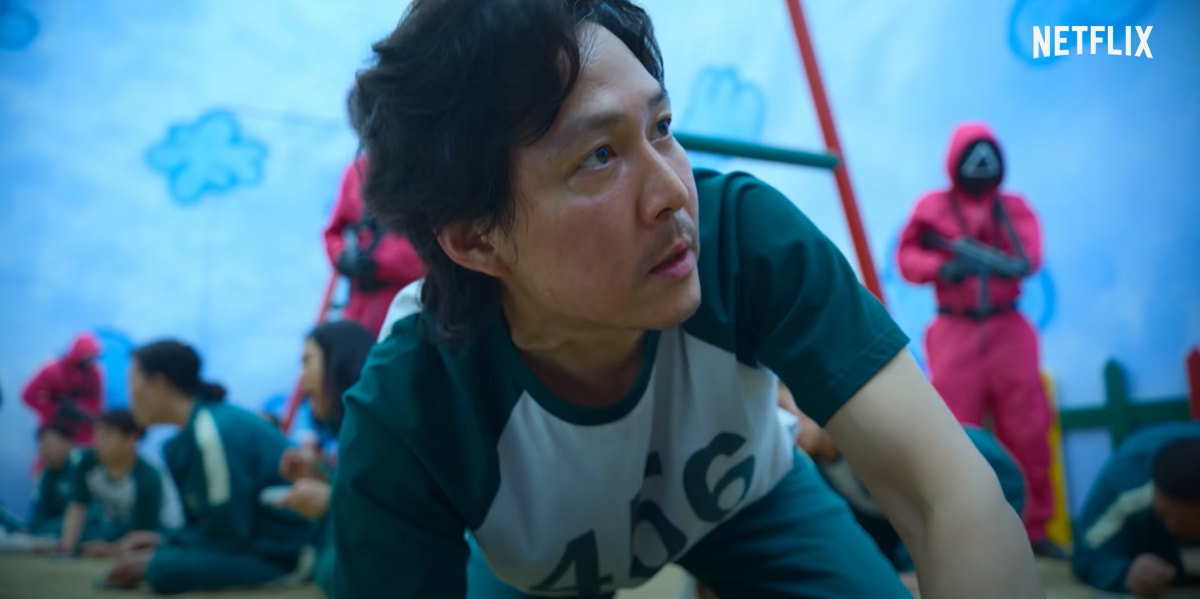How Squid Game's 'Get Rich Or Die Trying' Theme Mirrors The Harsh Reality Of Survival In Today's Culture
The game of life has never been so cruel.
 YouTube
YouTube The global No.1 series on Netflix right now is the South Korean thriller "Squid Game" — and for good reason!
Even though it's only been out since September 17th, the show's accrued a whopping 100% rating on Rotten Tomatoes as well as vast viewer approval across social media. Netflix's own co-CEO, Ted Sarandos, predicts that "Squid Game will definitely be our biggest non-English language show in the world, for sure."
While part of the show's appeal is its incredibly talented cast, fantastic set designs, and compelling plot, the thriller's theme of "get rich or die trying" has also struck a chord with many viewers who also find themselves struggling to get by.
What Is 'Squid Game' about?
Netflix's thriller "Squid Game" is an allegory about modern capitalist society.
The show's director, Hwang Dong-hyuk, said he was inspired to write an allegorical story about modern capitalism as well as "something that depicts an extreme competition, somewhat like the extreme competition of life."
The show follows the main character, Seong Gi-hun, and several others who are in dire need of money — and lots of it. 456 contestants are kidnapped and taken to a mysterious island, where they're forced to play a series of children's games. Losing a game results in a gruesome death, while making it to the end earns you a cash prize of 45.6 billion won — approximately $40 million USD.
'Squid Game' probes hustle culture.
Modern "hustle culture," as it's commonly called, falls in line with Hwang's interpretation of extreme competition.
Our capitalist societies encourage, if not demand, that we spend every minute of our lives working. And for those who refuse to do so, the consequences are often grim: not only are you dubbed "lazy," but you will instantly be replaced by another worker who's willing to work the extra hour you can't take on.
"Hustle culture" cultivates toxic competition among employees the same way the 456 contestants are pitted against each other. Only the crafty, lucky, and most desperate survive.
'Squid Game' critiques the impact of capitalism on human lives.
The players are told the grand cash prize increases after each game. The catch however, is that they're paying for the prize with their lives (literally). Each contestant is worth 100,000,000 won (around $84K USD), so for each death, the prize pool grows by 100 million won.
We learn early on that Gi-hun bets on race horses because of a gambling addiction.
Towards the end of the series, the mysterious Front Man tells him, "You bet on horses. It's the same here, but we bet on people." "Squid Game" takes a strong stance against the way society's "elites" play with the lives of ordinary citizens, and how they are often face little to no repercussions for their actions.
People have criticized the diminished value of human life long before the show came out. It's well known that these systems benefit those who are deemed more "valuable," such as the rich and educated, or those of a specific race and gender.
RELATED: Cop's Wife Posts TikTok Video Threatening Her Kid With A Wooden Spoon — Gets CPS Called On Her
Lives that aren't seen as equally valuable are disposable in the eyes of the privileged, and the show takes full advantage of this reality. While the destitute fight to survive in bloody games, the mysterious rich patrons sit back and enjoy the show.
The thriller suggests no one is ever truly safe.
Beyond the gripping plot, the show's cast of complex characters is what truly won the Internet over. But aside from endearing quirks and memorable one-liners, it's the backstories that weigh heavily on the viewer's mind.
RELATED: ‘The White Lotus’ Proves Why We Can’t Stop Watching Rich White People & Their Chaotic Lives
Gi-hun steals from his mother and struggles to financially support his young daughter. Another character, Sae-byeok, is a North Korean defector who needs money to find and rescue her surviving family.
Ali is a Pakistani immigrant who moved to Korea in the hopes of providing for his young family, but ended up being exploited for free labor.
"Squid Game" introduces these characters first to play into the tone-deaf notion that the poor are always "irresponsible," "lazy," or simply "unlucky."
But this is quickly turned on its head with the introduction of Sang-woo, who graduated from a top business school and went on to be the head of an investment team before getting caught up in seedy schemes. That's when the message truly sinks in — life can quickly sour for just about anyone.
While the methods of execution depicted in the series are nothing short of heart-stopping, so is the unsettling idea that there's no guarantee in life.
Even those who live comfortably can find themselves in dire straits, and there's little they can do to fix it. Considering how many lives have been uprooted amid the pandemic, it makes perfect sense as to why the show's resonated with so many viewers.
Despite "Squid Game's" grim reminders, many on social media have still been able to find humor in the show. The influx of "Squid Game" posts also makes one thing abundantly clear: it's a series people will be talking about for years to come.
RELATED: How Megan Thee Stallion's Collab With BTS Might Empower K-Pop Fans To Challenge Beauty Standards
Yona Dervishi is a writer who is currently working at YourTango as an editorial intern. She covers topics pertaining to news and entertainment.
